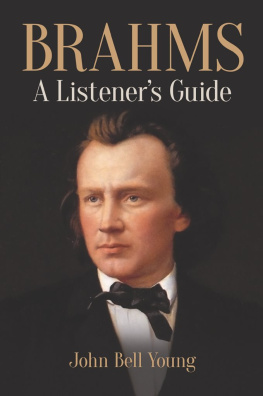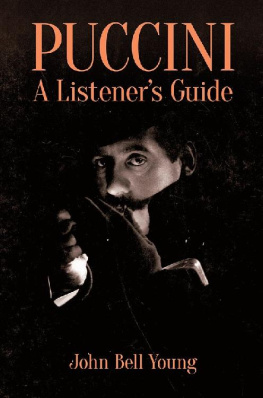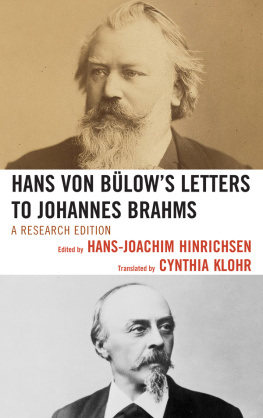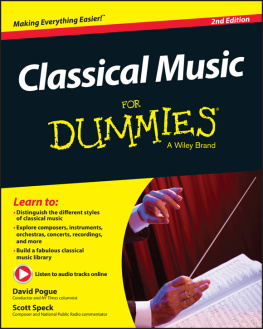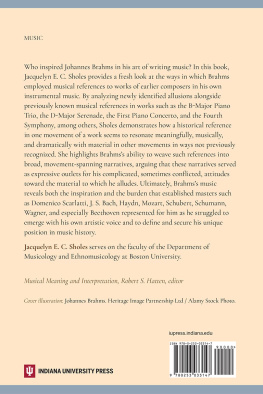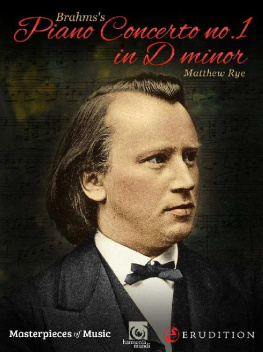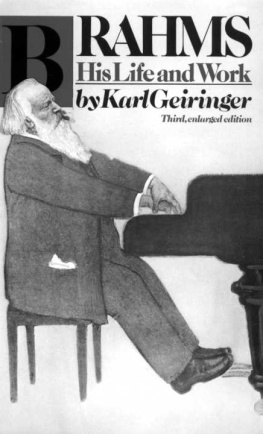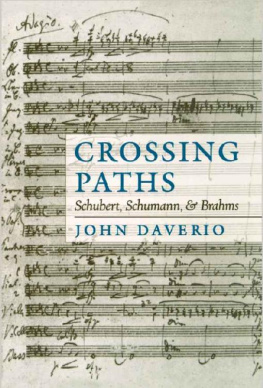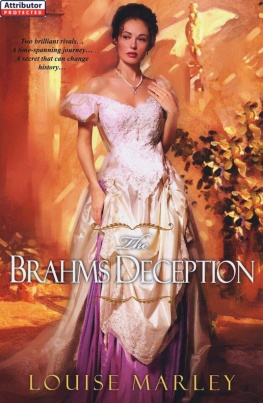BRAHMS
A Listeners Guide
BRAHMS
A Listeners Guide
John Bell Young
DOVER PUBLICATIONS, INC.
Mineola, New York
Copyright
Copyright 2008, 2017 by John Bell Young
All rights reserved.
Bibliographical Note
This Dover edition, first published in 2017, is a slightly altered republication of the work originally published by Amadeus Press, New York, in 2008.
Library of Congress Cataloging-in-Publication Data
Names: Young, John Bell, author.
Title: Brahms : a listeners guide / John Bell Young.
Description: Mineola, New York : Dover Publications, Inc., 2017. | This Dover edition, first published in 2017, is a slightly altered republication of the work originally published by Amadeus Press, New York, in 2008title page verso.
Identifiers: LCCN 2016027619| ISBN 9780486809380 | ISBN 0486809382
Subjects: LCSH: Brahms, Johannes, 18331897Criticism and interpretation.
Classification: LCC ML 410.B8 Y68 2017 | DDC 780.92dc23 LC record available at https://lccn.loc.gov/2016027619
Manufactured in the United States by LSC Communications
80938201 2017
www.doverpublications.com
For my dear friend of nearly forty years, Edward, Lord Montagu of Beaulieu (19262015), a gentle and wonderful spirit. Thank you, Edward, for everything.
Contents
Acknowledgments
W riting about music, or any work of art governed by abstraction, is no easy task. One is easily persuaded by force of habit and by long-held beliefs in the veracity of a point of view, as if objectivity were the only thing that mattered.
But as musicians worth their salt know only too well, there are no ivory towers: music is so complex and abundant as to invite any number of perspectives. And where those perspectives are informed and imaginative, they are worthy of contemplation.
Much the same can be said of any artistic endeavor, and writing is no exception. I am indebted, for their assistance and advice, to a number of friends and colleagues, several of whom were not even aware that what I learned from them would contribute to it so substantially, and several of whom did not live to see the completion of this project.
Above all there is my late mother, Dorothy Burgess Young, without whose support and unflinching belief in my abilities I could never have written this volume or even so much as played a single note of music. Whether it was eerie coincidence or something born of a grander scheme, Amadeus Press offered me the formidable challenge of writing a dozen books for its distinguished roster only thirty minutes after my mothers passing in July 2007 at age eighty-eight. And so it is in honor of her that I commit to this enormous and challenging project.
There are in addition a number of individuals to whom I am indebted for their support and advice, literary and otherwise, while writing this book. I have dedicated this new edition to my dear friend of nearly forty years, the late Edward, Lord Montagu of Beaulieu, a great and gentle spirit whose passing left a tremendous void in the lives of his many friends and admirers around the world. I also extend my thanks to Joseph Early and Sandra Rush, whose infinite patience, innumerable kindnesses, critical overview, and thoughtful consideration were not only proof of the deepest friendship, but equal to the best editorial advice; Reni Santoni and Tracy Newman, without whose assistance and counsel at a time when I most needed it I would surely never have been able to complete these works; Eric Le Van, a magnificent pianist and a leading Brahms authority, whose encyclopedic knowledge and critical suggestions have been absolutely invaluable; Stephen Hough, a great pianist and a gifted writer who took time out of his incredibly busy international schedule to have a look at my manuscript; Michael York and Hugh Downs, both experienced authors whose support has been unwavering; Mark and Camilla Tarmy, whose understanding and generosity of spirit know no bounds, and who have patiently put up with my sometimes impossible demands for convenience and quietude; Margarita Fyodorova, who taught me all about intonation and much more; Rick Bechard, whose eye and ear as a documentary filmmaker were invaluable, as he helped me to reconsider both style and narrative, which I can only hope will find in these volumes a writer who does them justice; Gordon and Emily Jones, Joseph Fichter, Julie Marden, and others in the extended Putney School family, for their encouragement, kindness, and help; and John Cerullo, the publisher of Amadeus Press, for his goodwill and extraordinary demonstration of courage, in that he invested his faith and corporate resources in this longtime columnist and critic but untested book author. Thanks, too, to Pete Lenz, my editor at Dover Publications, without whose patience and assistance this edition would not have been possible.
Finally, to those who are no longer with us, I extend my gratitude in ways that I can only hope will be borne aloft on the wings of angels. From these individuals I learned much of what I know of music. Among them are Constance Keene, a great pianist who was also my teacher and mentor for nearly thirty years; Michel Block, likewise among the great pianists of the twentieth century, whose musical savoir faire and personal gentility were a continual source of knowledge and enrichment; James Landrum Fessenden, a brilliant philosopher and musician whose premature death was a blow to all who knew him and whose willingness to share his phenomenally authoritative knowledge of any number of disciplines, from aesthetics to epistemology and psychoanalysis, has proven invaluable; Norwood and Cornelia Hinkle, whose exemplary years teaching music at the Putney School were an inspiration; and Claudio Arrau, Ernst Levy, and Andrzej Wasowski, the celebrated pianists who, in my few brief encounters with them, taught me more about music making than most could have done in a lifetime.
John Bell Young
Putney, Vermont
Introduction
I n this and future volumes for Amadeus Press, it is my objective to survey great music from a personal perspective, just as anyone would. Whatever I can convey of my ideas about listening, though informed by analytical scrutiny and historical data, will not be enslaved by technical analysis. While academia continues to do its job in the classroom, pointing out the idiosyncratic formalities of this or that composition as it teaches students to more effectively recognize compositional strategies, I prefer to do what I can to bring music to life in a kind of dialectical dance. These slim volumes for Amadeus Press, then, are part musical analysis and part interpretation, but above all a personal appreciation. My work here is not intended to be, nor should it be, construed as a work of scholarship.
Nowhere will I presume that the reader will be following my musical observations with a score in hand. So often when we listen to music, things seem to fly off the page of the score, or from the hands of the performer, in ways that strike us as inexplicably new and exciting, as if we had just heard the piece for the first time. Perhaps thats just how it should be. In any case, in attempting to put myself in the shoes of listeners, both those who are familiar with this music and those who may not be, I will do my best to bring them into the dynamic fold of the music as it reveals itself. And while there are certainly advantages to examining the score, there is also much to be said for letting your ears do what they do best when you trust your instincts: listening!
Among other things, I hope to establish a rapport with readers who may not be familiar with the technical terminology of music. Though I presume the reader has a minimal knowledge of the vocabulary of music, or access to information that would explain such things as meter, rhythm, note values, bar lines, and the array of Italian-language tempo and dynamic markings, I will nevertheless attempt to demystify some of the larger issues pertaining to musical experience.
Next page
